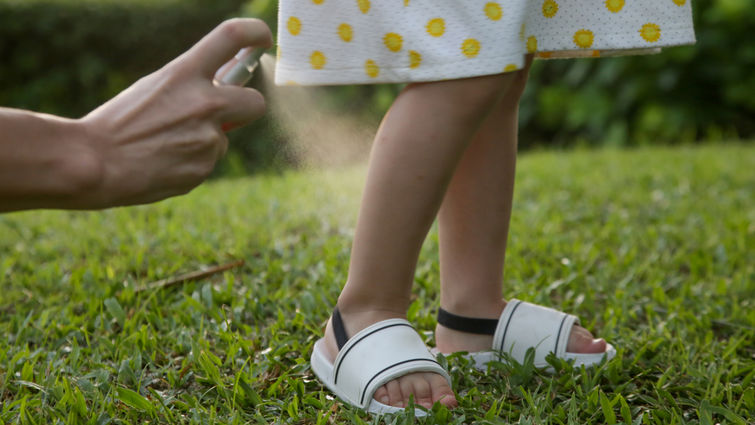
Dr. Allison Hensley encourages parents to use a safe form of insect repellent to protect kids from mosquito- and tick-born illnesses.
Warmer weather signals the opportunity for kids to play outside and the chance for families to do more activities together outdoors. However, warmer temperatures also signal the need to fight off reemerging bugs like mosquitos and ticks.
Allison Hensley, MD, a general pediatrician at Loma Linda University Children’s Hospital, says using some type of insect repellent on kids is important and not just because insect bites can be annoying.
“I think some form of insect repellent is often necessary because, depending on the area, there are many mosquito- and tick-born illnesses that you would want to protect your child from,” Hensley says.
Is it safe?
Hensley says in general, it is safe to use most insect repellents on kids over the age of two-months-old.
The Centers for Disease Control and Prevention (CDC) encourage the use of Environmental Protection Agency-registered insect repellents. When these repellents are used as directed, they have been proven to be safe and effective.
For babies under two-months-old, Hensley recommends using a protective netting to cover their carrier or car seat.
Ingredients
Some ingredients shown to be effective against insects, according to Hensley, include DEET, Picaridin, and oil of lemon eucalyptus. A full list can be found on the CDC’s website. The CDC does not recommend using insect repellents that contain oil of lemon eucalyptus on kids under the age of 3.
Non-chemical options
“There are some natural insect repellents that don’t have these chemicals in them,” Hensley says. “While they have been deemed safe, they are not scientifically proven to be effective. Some may help deter mosquitoes, but they may not be as effective as the medicated versions.”
Another natural pest deterrent is long clothing that your child wears — for example, when they’re headed outdoors, have your child wear long sleeves, long pants, high socks, and a hat.
Application
Hensley reminds parents to be cautious of proper application of insect repellent on their children. “You need to read the label and make sure you’re following the directions properly,” she says.
Insect repellent should only be applied to exposed skin and/or outer clothing. Avoid contact with the eyes and mouth. “If you do want to apply it to your child’s face, spray a little on your hands and rub it into the exposed areas of their face, still avoiding the eyes and mouth,” Hensley says.
Insect repellents such as DEET have different concentrations based on the length of time they’re effective outdoors after one application. For example, Hensley explains that 10% DEET would give the wearer two hours of protection, 30% would give the wearer five hours protection, and so on. Use the percentage of DEET that matches the amount of time you’ll be outdoors.
Hensley says acceptable forms of insect repellant for kids come in stick form, lotions, or unpressurized sprays.
Things to Avoid
Hensley lists some things for parents to avoid:
- Avoid reapplying insect repellent more than once a day.
- Avoid using an insect repellent with any chemical percentage, like DEET, higher than 30% on kids.
- Avoid using insect repellent that also includes sunscreen.
- “What parents may sometimes do is want to reapply the bug spray for the sunscreen protection,” she says. “But then they’re overusing the product. Instead, make sure to use a separate sunscreen, applying it first to the skin and adding the insect repellent on top.”
- Avoid spraying insect repellent on your child’s hands.
- “Children naturally put their hands in their mouth,” she says. “Doing that with insect repellant on their hands can be dangerous.”
- Avoid application on irritated skin or any cuts, for example, your child’s active eczema flare.
- Avoid dressing your child in bright colors or floral prints when they’re headed outdoors as these colors and prints tend to attract bugs.
- Avoid wearing scented soaps, perfumes, hairsprays, or lotions when you and your children are going outside.
Poison Prevention
Severe reactions to insect repellent in kids are rare; however, it could happen, says Hensley.
If your child develops an allergic reaction to the repellent, such as a rash, Hensley says to wash the affected area with soap and water, call the Poison Control Center for advice, and, if there is a significant skin reaction, contact their pediatrician for an evaluation appointment.
Additionally, if your child swallows insect repellent, rinse their mouth, have them drink water, and contact their physician or the Poison Control Center at 1-800-222-1222.
